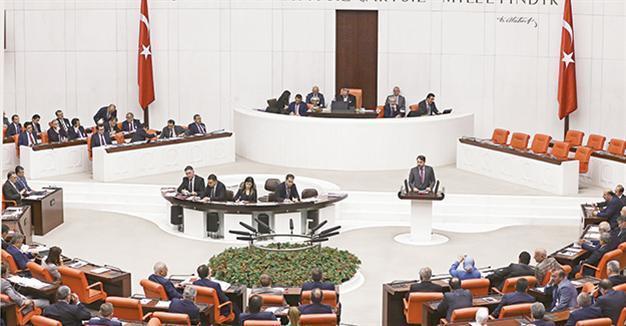Opposition slams gov’t bill amending electricity law
Bülent Sarıoğlu - ANKARA

AA photo
Turkey’s opposition parties have strongly objected to a government-sponsored bill that will force “honest consumers” to pay for leakage and losses in electricity, as Energy and Natural Resources Minister Berat Albayrak fiercely defended the bill.
The opposition attempted to obstruct discussions of the bill over objections to the legalization of the distribution of costs stemming from losses to 36 million subscribers.
Only the general points of the proposal had been debated by late June 1. Due to motions tabled by all three opposition parties – the main opposition Republican People’s Party (CHP), the Peoples’ Democratic Party (HDP) and the Nationalist Movement Party (MHP) – the AKP elected to make Parliament’s General Assembly work over the weekend as well.
CHP İzmir MP Tacettin Bayır said 33 billion Turkish Liras had been paid to electricity companies under the heading of “costs of leakages and losses” from 2006 to 2014 while the government made 39 billion liras during the same period through privatizations.
Bayır said the leakage loss usage of six provinces was four times the amount of power produced by the Atatürk Dam, the largest of its kind in Turkey.
“Those who use illegal electricity are dishonest. So you’re not going to distinguish the honest and the dishonest, you’re going to add the electricity bill of illegal users to the bills of honest users who pay their bills on time, and you’re going to obtain that money from the honest. Could the honest and the dishonest ever be the same?” Bayır asked from the podium.
Responding to reactions, Albayrak instead criticized the opposition to nuclear power, while suggesting that developed countries had been utilizing nuclear energy.
“There is a way/case to increase the storage capacity and the gas capacity in order to eliminate the risks that can occur during the warehousing … In the legislation, there are many legal regulations that clear the way for the EPDK [Energy Market Regulatory Authority] and independent institutions to swiftly regulate the investment. There are many articles apart from that. In addition to what we said about the leakage and loss issue, there is a judicial regulation which states that the warning that the jurisdiction gave us, our government, the year before will not be a jurisdiction issue once again,” Albayrak said.
When “energy supply security” is mentioned, the portfolio should be implemented in a balanced way and dependence on foreign sources should be reduced to a reasonable level, he said.
“You also need to benefit from Turkey’s resources to the maximum. ‘Let’s not mine coal,’ ‘Let’s not build any HES [hydroelectric power plants],’ ‘Let’s not build a nuclear power plant,’ ‘We are dependent on importation of natural gas, let’s not do it.’ Well, all right, then how in the name of God are you going to generate Turkey’s 265 billion kilowatt hours of electricity, how are you going to supply that, how are you going to supply that electricity to people’s houses? We take on this responsibility and we are aware of the burden of this responsibility. At this point of responsibility, your positive criticism are more than welcome,” he said.
In response to taunts by opposition deputies, Albayrak reacted by saying, “If you listen, you will understand,” “If you listen you will comprehend,” and “If there is anyone who didn’t understand, let me explain once more.”
The remarks drew the ire of the opposition deputies, with the MHP’s deputy parliamentary leader appealing to Deputy Parliament Speaker Akif Hamzaçebi to “warn the minister over his offensive wording.”
The CHP’s deputy parliamentary leader, Özgür Özel, meanwhile, took the floor and said: “We want to remind Mr. Minister that this is neither his dad’s house nor his father-in-law’s illegal palace.”
Albayrak is the son-in-law of President Recep Tayyip Erdoğan.
“He is not allowed to speak like that here,” Özel said, to the applause of the CHP deputies, while the AKP deputies reacted.
Hamzaçebi closed the session due to the tension in order to resume plenary debates on June 2.
